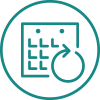
Urine Chemistry

Urine Chemistry
Purpose:
The Urine Chemistry programme is specifically designed to assess the performance of the routine Clinical Chemistry laboratory to analyse basic core tests in urine (including 24hr urine samples). These urine tests cover a wide application of disease states, such as in the investigation of renal function, and various endocrine disorders. Examples include: Albumin: Creatinine ratio (ACR) and Protein: Creatinine ratio (PCR) for the investigation and management of Chronic Kidney Disease (CKD), NICE guideline [NG203]; Calcium (for hypercalciuria) Uric acid (for hyper- or hypo- uricosuria), Sodium (for hypernatriuria) as part of the metabolic investigation for the assessment and management Renal and ureteric stones: NICE guideline NG118; Urine magnesium in the investigation of renal magnesium wasting; Amylase as an indicator of chronic hyperamylasaemia, or acute pancreatitis; Chloride in the diagnosis of metabolic alkalosis and in the differentiation of low effective circulating volume and mineralocorticoid excess; Urinary osmolality to assess renal concentration capacity and in the investigation of polyuria and Diabetes Insipidus and the fractional excretion of analytes such as sodium, potassium, urea, magnesium and phosphate, in the differential diagnosis of pre-renal disease, acute tubular nephropathy, AKI, and mineralocorticoid disorders.
Scope:
Three levels of fresh filtered human urine are distributed monthly for testing of 14 Urine chemistry measurands along with 2 calculated parameters, Albumin/Creatinine and Protein/Creatinine ratios. Separate acidified samples are provided for Calcium, Phosphate and Magnesium analysis to enhance stability. Fresh human urine is used as the matrix, with additional samples spiked with the measurand to achieve the appropriate clinical range.
The samples are distributed on more than one occasion which allows for the assessment of between batch imprecision. Seventy two samples are provided over the course of a year.
The programme assesses both laboratory and method performance, including linearity, bias, within and between batch imprecision.
 |
Key Features:
|
| Urine Chemistry Programme | ||
|---|---|---|
| Analyte | Approx. Range Covered | |
| Sodium | 13 - 200 | mmol/L |
| Potassium | 9 - 137 | mmol/L |
| Chloride | 13 - 300 | mmol/L |
| Urea | 38 - 500 | mmol/L |
| Creatinine | 1.0 - 22 | mmol/L |
| Glucose | 0 - 40 | mmol/L |
| Calcium | 0.5 - 7.0 | mmol/L |
| Phosphate | 6 - 35 | mmol/L |
| Protein | 0 - 2 | g/L |
| Albumin | 0 - 2000 | mg/L |
| Magnesium | 0.5 - 8.5 | mmol/L |
| Urate | 0.5 - 5.0 | mmol/L |
| Osmolality | 100 - 1000 | mmol/kg |
| Total Amylase | 0 - 400 | IU/L |
| Albumin/Creatinine ratio | 0 - 200 | mg/mmol |
| Protein/Creatinine ratio | 0 - 300 | mg/mmol |
Related Documents
Last updated: 24/04/2024








